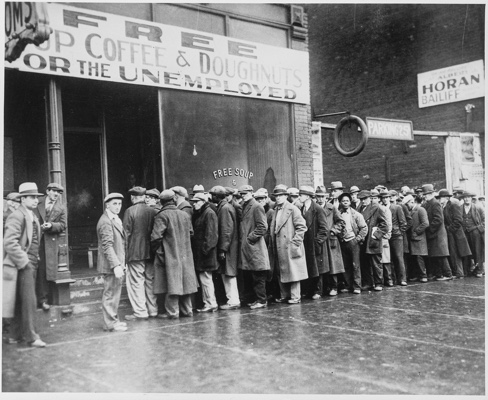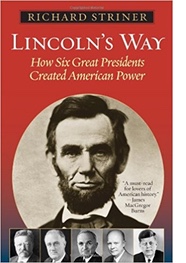America in Crisis: Both Parties Have Forgotten the Lesson of the Great Depression

Fifth in a series: America in Crisis
If people believe they are getting along fairly well in their quest for the good things in life, they may be far less susceptible to movements that threaten democracy. But when nations fall into economic distress, public life can turn into a nightmare. And that is what has happened to America.
Were it not for the Great Recession that started in 2008 — and the “jobless recovery” that followed — the magnitude of our nation’s current crisis would be far less urgent than it is.
 The problem of maintaining full employment in recessions and
depressions preoccupied the people who lived through the Great
Depression, World War II, and the postwar aftermath. The New Deal
ameliorated some of the bitterness and suffering of the Depression,
but only wartime conditions brought America full-fledged recovery.
By 1943, the economic consequences of the military effort were
impossible to ignore. Government spending was so colossal that
America actually suffered from a labor shortage — at least
on the home front. Anyone who wanted a job during World War II had a
job.
The problem of maintaining full employment in recessions and
depressions preoccupied the people who lived through the Great
Depression, World War II, and the postwar aftermath. The New Deal
ameliorated some of the bitterness and suffering of the Depression,
but only wartime conditions brought America full-fledged recovery.
By 1943, the economic consequences of the military effort were
impossible to ignore. Government spending was so colossal that
America actually suffered from a labor shortage — at least
on the home front. Anyone who wanted a job during World War II had a
job.
And so it was that in election year 1944, the Republican nominee, Thomas Dewey, proclaimed that “if at any time there are not sufficient jobs in private employment . . . then government can and must create additional job opportunities because there must be jobs for all in this country of ours.” The Employment Act of 1946 vested the federal government with permanent responsibility for maintaining high levels of employment. Americans in general had come to the conclusion that if market contractions were sufficiently severe, the economy would sink to a very low level and stay there until massive purchasing power was restored through the action of the public sector.
It was in light of this policy verdict that Dwight D. Eisenhower called a cabinet meeting in response to a recession in 1954. Ike told his cabinet to generate proposals for big and expensive public works projects designed to be either speeded up or slowed down in order to even out the level of employment. The result was the Interstate Highway System, and American prosperity surged in the 1950s. The prosperity continued in the Kennedy era when Project Apollo served not only to inspire the American people but also to deliver a continuing economic stimulus.
But both of our parties are incapable of generating policies like those anymore.
By the 1970s, the method of fiscal stimulation (for a number of reasons) fell into disrepute and the force of the 1946 Employment Act was gutted in the Humphrey-Hawkins Act that was passed by Congress in 1978 and signed by Jimmy Carter.
After that, both the Democrats and Republicans forgot the generational lesson of the Great Depression and World War II and they found themselves incapable of supporting either middle class or working class prosperity. Even in the so-called “boom” of the Reagan era, the middle class and working class standards of living were declining.
Though Bill Clinton’s strategist James Carville used the slogan “it’s the economy, stupid” to focus the energies of Democrats in 1992, the recession that toppled the elder George Bush ran its course without much effective remedial action by Clinton, who proposed a rather puny stimulus package in 1993 that the Republicans filibustered to death. The recession at last gave way to the “dot-com boom” by the end of the nineties and Bill Clinton breathed a sigh of relief. But the “Great Recession” that began in 2008 did not run its course in the eight years that followed, notwithstanding a substantial package of stimulus spending that Barack Obama and the Democratic Congress pushed through in 2009.
This was the largest economic contraction since the 1930s and Obama’s package was insufficient, as events would unhappily prove and as the economist, journalist, and Nobel Prize winner Paul Krugman kept pointing out, again and again, to no avail. The “recovery” — such as it was — was the “jobless recovery” that cost the Democrats dearly in the mid-term elections of 2010. Indeed it cost the Democrats so dearly that it nullified the rest of Obama’s presidency in most respects. The justly enraged but unjustifiably irrational Tea Party movement gave Republicans the power to block almost everything else that Obama would propose for the balance of his two-term presidency, except for Obamacare and some executive orders that are currently being rescinded.
The recovery program of Obama was insufficient, indirect, and too subtle by half. It remains to be see whether “progressive” or neo-populistic followers of Bernie Sanders will get very far in the age of Donald Trump. The radical right has been able to convince a great many of the “Red State” voters that government action in the Great Recession went too far — that it worsened economic conditions.
In most respects, the right clings tenaciously to the dogma of “pure” free enterprise — as applied through the doctrines of deregulation and supply-side tax reduction — impervious to the way in which our corporate sector, if left to itself, just goes right on doing the sorts of things it seems to do best these days: shipping jobs overseas, investing in bubble assets, and pushing the salaries of CEOs ever-higher as the blue-collar workers scrape and struggle. The gap between our wealthy elite and the blue collar class is now as bad as it was in the 1920s. But this is still not enough for certain billionaires — like the Koch Brothers — who fund the radical right and egg it on.
Back in 1980, David Koch — as the vice presidential nominee of the Libertarian Party — condemned both Social Security and Medicare.He accused Ronald Reagan of supporting the nanny state. Now he and his brother call the shots in congressional elections around the country by channeling massive campaign contributions to extremists. They want to see Obamacare wiped off the books, and they do not want to see it replaced.
They oppose the very idea of a social safety net, regardless of why it was created. But do they really want to bring back the bad old days in which the destitute would die in the gutter? Perhaps so. They keep trying to destroy the kinds of federal protections that millions of people depend on.And they feel self-righteous as they do it. Indeed, they see this as a work of philanthropy.
They believe that we should thank them for their efforts.
And Donald Trump? He used to brag that he would punish the companies that export jobs: he would hit them with some stiff new taxes. But aside from a few token gestures here and there, that promise has remained unfulfilled. He has also promised a trillion-dollar infrastructure program, but it seems as if this program will actually cut the federal role in favor of some half-baked incentives to encourage the building of toll roads and the like. All the while, he convinces his followers that their economic troubles have been caused by the “blue state” elitists — and it appears that he is getting away with it.
The Democrats were given a window of opportunity in 2009 to reverse the Great Recession with some projects that would put the unemployed to work and do it quickly. They blew it and they paid a heavy price.
And so if Trump neglects his promises, will the same thing happen to him? Will his followers rebel and conclude that he was nothing but a con man? Or will they be content to just chortle at his hate-filled tweets and take out their legitimate frustrations on people who are worse off than they are? We shall see.
The memories of the faraway times when the policies of Eisenhower and Kennedy gave us broad-based prosperity that shielded us from extremism appear to be too distant now to help America. And so we drift, attacking one another when we ought to be joining together in a mighty work of rebuilding. Unless some way can be found to approximate the economic achievement of the mid-twentieth century — a time when the public sector and the private sector enhanced one another in the mission of providing full employment — we are doomed to keep spiraling downward.
We are pelting one another with our economic wreckage as the super-wealthy grin from ear to ear. And Donald Trump is becoming more bloated than ever by investing in whatever turns a buck.